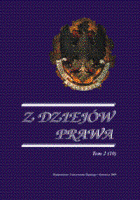Tomasza Piotrowskiego żywot niegodziwy. Przyczynek do dziejów przestępczości w Polsce wieku Oświecenia
A vile life of Tomasz Piotrowski A reason to the history of crime in Poland of the Enlightenment period
Author(s): Marian MikołajczykSubject(s): Law, Constitution, Jurisprudence
Published by: Wydawnictwo Uniwersytetu Śląskiego
Summary/Abstract: The recent studies conducted on crime in pre-partition Poland significantly widened our knowledge in this field. The very studies concerned almost exclusively the crime issues in village and small town environments typical of the former Poland. The article presents the life and actions of Tomasz Piotrowski, one of professional criminals living in a village, accused and sentenced in 1792 in Kraków. He started his criminal activity from small thefts, however, specialized in church breaking and entering. During almost 10 years he committed at least 60 such crimes. He broke into its inside in many different ways (e.g. by means of crypts or through the window). He mainly stole the money from church box, and took gates or even lithurgic vessels from time to time. His neighbours did not realize that Piotrowski was a perpetrator of a sacrilege, but suspected him of committing petty thefts. They tolerated his behaviour because he did not commit any crimes in his place of living. The text discusses only one example, however, it points out to the necessity of further studies on the history of crime in Poland.
Journal: Z Dziejów Prawa
- Issue Year: 10/2009
- Issue No: 2
- Page Range: 47-75
- Page Count: 30
- Language: Polish

